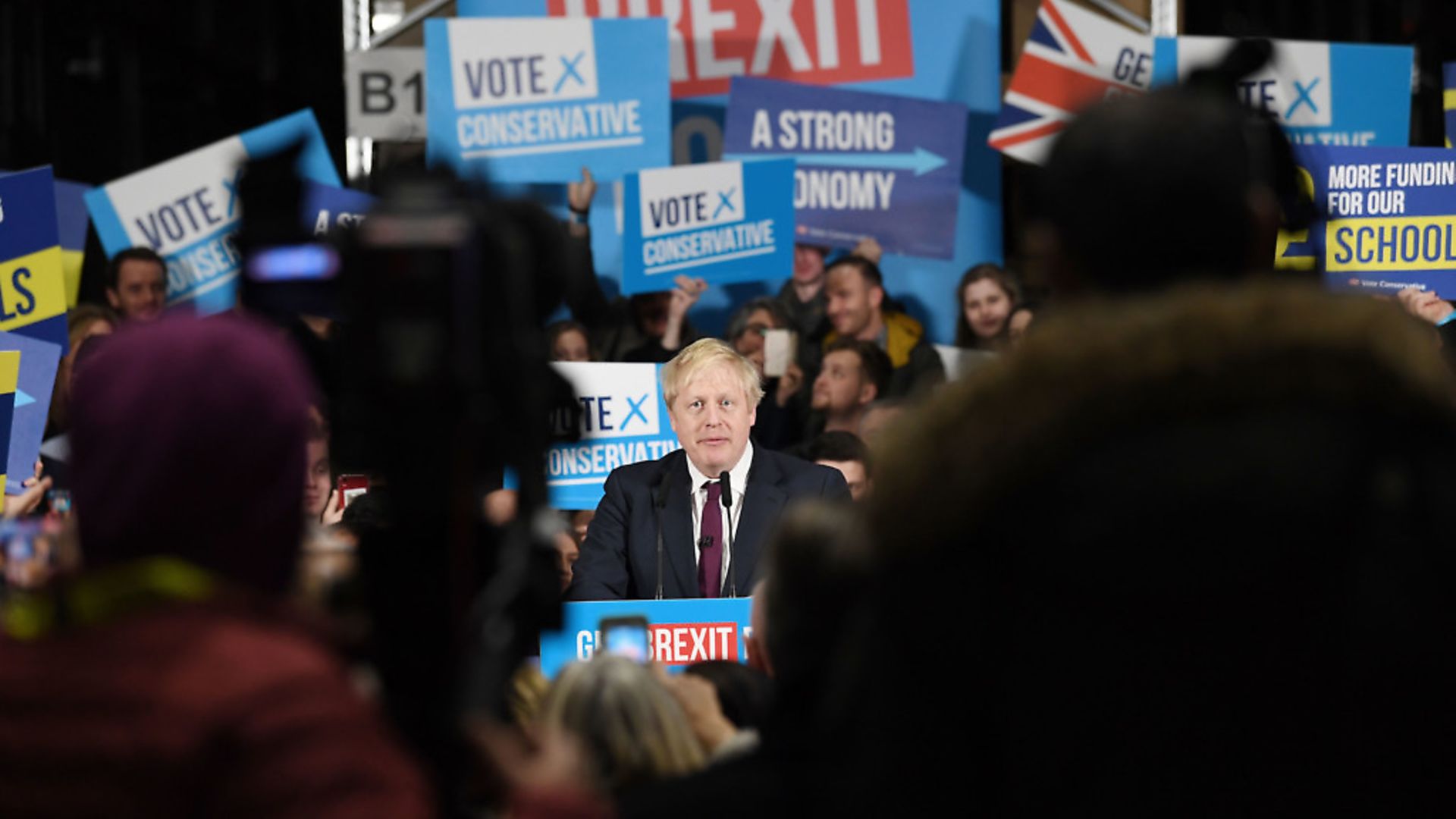
The Tories are now left to own the Brexit project all by themselves – it’s time for an effective opposition to hold them to account.
Let’s be honest: All prospect of stopping Brexit has now vanished; all notion of even ameliorating it is fantastic. It is not at all inconceivable that the whole process, governed by ego and bluster, devoid of challenge, scrutiny or careful thought, will turn out to be a disaster in the relatively near future, but all the organising principles of resistance to it have been upended by this week’s results
Likewise, the quest for a silver lining is premature. There is a certain cognitive dissonance when hit with a result like this, that is so resounding and yet so at odds with the quality of any of the campaigns; you want to look on the bright side.
You want to find reasons why a large majority might improve the prime minister’s character rather than shore up his already excessive confidence. You want to think that maybe a wipeout will be good for Labour, because we know for sure, now, that we cannot escape the two-party system, so the opposition cannot afford anything other than its most popular leader, its most powerful engagement. But that’s all basically self-soothing.
To those who saw avoiding Brexit as the most pressing issue facing the nation, this was a devastating result. To those who thought perhaps the causes of Brexit, the sense of disconnectedness, the relentless grind of trying to weather the constant erosion of the social safety net and, indeed, society, were more important, this is also a devastating result.
It really won’t cheer anyone up to pretend otherwise. Extraordinary areas went to the Conservatives – Sedgefield, Tony Blair’s old seat; Workington, home of the archetypal swing-voter, the man who played rugby, was always Labour, voted Leave. All the clichés of the Conservative bid for power – that these Leave seats now saw Remain as an entirely elite project, and could no longer identify with a party that even considered it an option – turned out to be true.
There are nevertheless reasons, if not to be cheerful, then not to give up. This was a undoubtedly a Brexit election – the areas that went Conservative, sometimes having been Labour for nearly 100 years, map very closely onto Leave-voting areas.
There’s a lot of talk on the Remain side at the moment about the need for humility, the need to realise how much people who voted for Brexit felt disregarded by the subsequent debate, the need to acknowledge that even had it been overturned by a second vote, that democratic deficit would have remained an open sore. And yet, it was pretty low salience on an individual level. Even people who were determined to get out of the European Union had hitched that to some other agenda: Leave, in order to spend more on the NHS; leave, in order to have sovereignty; leave, in order to stop talking about leaving.
We have all lived through a hideous limbo where no progress was made in arresting the process, yet nor could it move forward itself, as it didn’t have any sense of direction, having no rational, beneficial endpoint.
Now that they own this project outright, let them own it. You know what? I’m bored of talking about it as well. Let them embark on this journey which will deliver none of its vaunted riches, its lofty empowerment, and answer to the disappointment that will be all of its own making. Our job now is to get ahead of their self-justification.
It’s plain where they will lay the blame, when their plans go awry: Exactly where the prime minister has always fired his missiles, out of sheer bellicose spirits, before he even needed to find a culprit: Literally everywhere – at immigrants, at people of colour, at Muslims, at single-mothers, at benefits claimants, at people who use foodbanks, you name the community, if you can silo it with casual insult, then for sure you can point the finger at it when things go wrong. The job of the progressive left – and risking complaints I’m including everyone in that who is not Conservative – is to build some meaningful solidarity between regularly demonised groups, frankly, between all of us.
It is an easy thing to say, and salutary to remember that we failed at this under Cameron-era Conservatism, which was just as violent an assault on some groups, but didn’t have the same scattergun disregard for so many people at once. But resistance to the Tory agenda was really capsized in 2016, when we turned instead to fight the urgent business of the unusual chaos the EU referendum had unleashed.
They say politicians campaign in poetry and govern in prose; the Conservatives campaigned in doggerel so God only knows to what depths they can sink in government. But we can say with relative certainty that they will be united, at least in the short term, since they have kicked out their dissenters and comprehensively auditioned their yes-men.
The Labour Party, by contrast, is already riven with division. It is likely that Corbyn will resign and John McDonnell will take over as interim leader. They will fight about how long the leadership contest should last – voices from the left and right of the party came early out of the traps to say don’t rush it, others will say, don’t waste this time.
There will doubtless be battles about Corbyn himself, long after his departure, since this is defining, whether you think he lost because his programme was too radical or he himself was an incompetent opposition leader, never landing a blow, wandering off, distracted, querulous, paranoid.
There will be skirmishes about those who surrounded him, their pugilistic aspect and the sense that they were always happiest opposing members of their own party. I don’t really hold with the view that these conflicts should be quashed or held in private. The result is as bad as it could possibly have been: There’s really nothing to lose from being open about what comes afterwards.
What they should no longer argue about is Brexit itself; it’s over. It doesn’t matter whether the party was too Remainey or not Remainey enough. These were only ever cypher issues for a battle over the soul of the party, these slippery, shifting questions of whether staying in the EU represented a desire for a Blairite status quo or an internationalist vision for solidarity across borders; whether Remainers were insufficiently loyal to Corbyn or just disappointed in his failures of pluralism; whether the party was about listening to the north, or solidarity with migrants; whether those things had to be at odds.
Let’s just have those conversations on their own merit, without hitching them to an outcome that turns them into binaries and, besides, we can’t control.
As the results were piling in the small hours of Friday morning, a rather winning press release went from the Hansard Society: It documented the schools who’d held mock elections in tandem, 41,000 pupils in all. It doesn’t really matter who won, except to say that the Conservatives came third.
The Tories aren’t daft: They know they’re not the party of the young, and young now goes right up to 40, an ever-replenishing pool that does not respond to casual xenophobia and authoritarian pantomime.
They will be looking to get as much of their programme through as they can, fast; the job of the opposition is to do more than resist it, it’s to build what comes next, for the politically homeless, for the politically evicted, for the literally homeless.
Warning: Illegal string offset 'link_id' in /mnt/storage/stage/www/wp-includes/bookmark.php on line 357
Notice: Trying to get property 'link_id' of non-object in /mnt/storage/stage/www/wp-includes/bookmark.php on line 37







